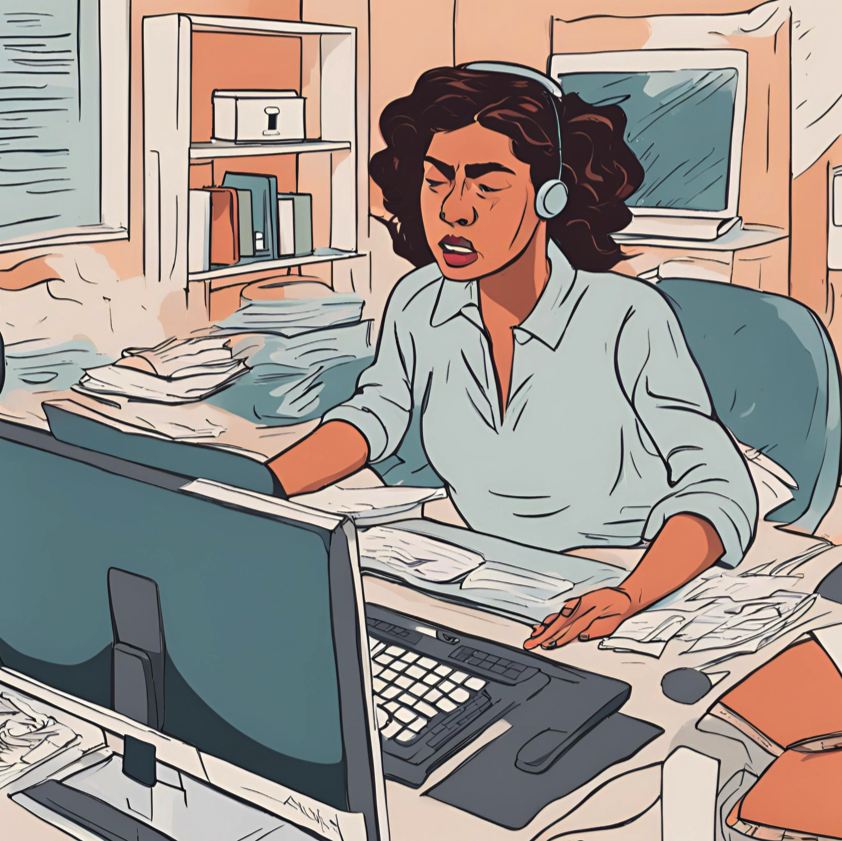‘Either do something about it or stop stressing,’ popped into my head as my friend started complaining about how little she’s done this weekend despite her grandiose plans.
‘Chill, Lucy,’ said our common friend, ‘it’s a weekend.’
‘I know,’ she said, letting out a heavy sigh. ‘I’m just constantly behind. I thought I’d catch up with work during the bank holiday.’
Watching Lucy brought me back to the memories of visiting the seaside with my family during my teens. I desperately tried to suck my belly in, withholding my breath, so that it wouldn’t show through my swimsuit. A family friend had noticed and asked what was the matter.
‘What’s wrong?’ He asked.
‘Can’t you see how fat I am?’ I asked, pointing at what seemed obvious.
‘Doesn’t look so to me. But if this bothers you — do something about it. Otherwise, your inaction shows you’re accepting this as the norm.’
Rest or push? Tiredness or an Excuse?
If you keep pulling a string, one day it’ll tear apart. To remain productive we need rest. Yet, where is that balance between self-discipline, determination to go the extra mile, and essential recharging?
Undoubtedly, it’s better to rest and leave the work for the following day, instead of delivering a mediocre outcome when you’re unproductive. Equally, what is the point of spoiling your and your friends’ mood while you’re already at a party instead of working at home? So, whatever you’ve chosen, better enjoy it.
However, following that logic we might end up with piles of work that one day become unfeasible to manage.
Drop the Work to Remain Productive
Have you ever noticed your productivity soar after a complete break?
To rejuvenate, it’s handy to take your mind completely off work, at least once a week. Even if you love what you do, having a break — a scientifically proven fact — only helps to get back on track more productive, creative, inspired and efficient. Rest for your brain after a working week is the same as rest for your muscles between gym sessions — essential for recovery and growth.
To Stay Fresh & Focused Switch Between Activities
It’s not just rest that makes us more productive; changing activities also plays an important role. To avoid being semi-productive, with unfinished tasks left behind, as a result, aim to manage your week wisely. This prevents the overwhelm and inability to rest and let go of work when you’re off. Switching activities in a structured manner is beneficial, as long as it’s not hopping from one task to another.
For example, to keep your brain sharp, alternate types of activities. Spend the first three hours writing a brief and the next two hours crunching the numbers. If the nature of your activities remains the same, even if you’re doing different tasks, your brain will get overwhelmed.
However, avoid the trap of multitasking or constantly switching tasks. Developing focus requires dedicating sufficient time to a particular task. There is a balance to be maintained—spending too much time on one task or a set of similar activities without breaks can blur your focus, while insufficient time leads to a lack of concentration.
One Thing at a Time
Aim for 100% efficiency. When working, have 100% focus. When partying, have 100% fun. If you’re at a weekend getaway or a remote wedding — take the work out of your mind and have fun. Remind yourself it was your choice and accept the responsibility. Thinking about work doesn’t get it done, it only ruins your state and exhausts you and that’ll negatively impact your productivity the following week when you’re back to work.
When engaged in a certain activity, ensure your brain is clear from other distractions. Otherwise, contemplating other priorities jeopardises your experience.
Avoid Sitting on Two Chairs
When your brain is foggy with doubts or struggles with choices you’re barely present and — if at work — questionably productive. Splitting your brainpower between current activities and other possibilities leads to reduced efficiency.
For instance, imagine you need to finish a piece of work, but keep thinking about going to the gym because you missed your morning workout. It might be the case that a gym session will help you to refresh your mind and you’ll be able to finish your task quicker afterwards. Then go to the gym. Or, you know that you won’t get back to work yet you need to finish it tonight. So, then a choice is obvious as well.
Avoid sitting on two chairs, make a quick decision and stick with it. If it proves to be the wrong one then, next time, try it the other way around. It’s better to make a prompt choice and learn from it, yet to enhance your decisiveness. Too much contemplation only affects your mental state and reduces your productivity. Overthinking doesn’t always guarantee the best decision but always costs time and focus.
Addressing Lack of Discipline
Sometimes, pursuing lower-priority or irrelevant activities is an easy choice. This could indicate poor discipline, when we, neglecting our priorities, delve into an activity that gives momentarily rewards and a sense of satisfaction. This can come in different shapes, including helping your boss or a client to feel good from a metaphorical patting on your shoulder, instead of saying No or Not now and progressing with your plan.
If you recognise yourself in this scenario, and that disturbs you, ask yourself, what truly matters to you. What do you want to achieve in life? What do you want to achieve in business?
Before committing to any activity, think about the outcomes, and how they are aligned with your ultimate goals. It’s too late to blame yourself for a wrong choice after it’s been done. At that stage, accept responsibility with grace and enjoy the experience.
Punishing or blaming yourself for a ‘wrong’ choice and promising to fix things later or ‘not do anything like this again’ — won’t help. This only reinforces the pattern.
A Sign of a Weak System
Keeping in the back of your mind the things you failed to complete won’t help to resolve an issue. Some use this as leverage to feel better. As if, ‘OK, I’m not that productive but at least I keep constantly thinking of that.’ Unfortunately, it doesn’t work this way.
The first question to ask yourself should be: ‘How can I improve my performance?’ That includes your productivity, quality of outcomes, and efficient systems.
Measuring your performance, for example, you might discover that your top productivity hours are from 9 am to 1 pm the time you might be spending in a gym or dealing with admin, and so forth.
Afterwards, ensure your expectations are reasonable. Let’s say it takes you three hours to produce a report. So, planning to create five of them in under two hours will only lead to anxiety because it’s beyond your current capabilities. Not to mention that it’d be handy to allow extra time for the unforeseen. This stress could’ve been eliminated right from the outset, should you’ve been more realistic in setting initial targets.
Bear in mind as well that we all perform differently depending on the type of activity. That’s why, if speed is crucial, hire an assistant, who is more efficient at the routines that slow you down and stick to what you’re best at.
Plan realistically how much you can manage within a given time frame. Completing your agenda in less time will be more satisfactory than trying to brush an endless to-do list when you wish, and often need by that stage, to relax.
One Train at a Time
Don’t try to catch up with everything you’ve failed at. Yes, you lost time. But it’s trickier to jump on a moving train than to wait for the next one to arrive.
Let’s say you planned to do important work on Monday but got carried away with a friend on a bank holiday, don’t stress. Instead of frantically trying to catch up, aim for the best result from the first attempt. This mindset helps you pick the best time to complete a project or activity.
And instead of beating yourself up for failing to stick to your plan that’d only lead to you feeling demotivated, focus on the next item on your list. For example, if you’ve started a 5 am workout routine — don’t compromise on that.
First, you’ll be more energetic and efficient in the morning. Second, focusing on your next ‘train’ and succeeding tomorrow according to your plan will make you feel like a winner, resetting your mindset.
Trying to catch up on today’s missed tasks will only lead to disappointment. This is that rare scenario when it’s better to postpone things. Remember, mediocre quality only leads to double the volume of work and disappointment. However, don’t fail on your new commitment — that leads to lost self-respect.
Whenever you fail in your plan, instead of criticising yourself, imagine you’re in the army. No matter what you’ve managed or haven’t managed to do today — you’ve got to wake up tomorrow at the same time and stick to your routine.
The Quickest Route to Become Organised and Avoid Disappointment
Whatever you do — accept responsibility for your choice and enjoy the experience.
Stick to your plans.
Stick to your routine. It’ll help you feel better when you fail to stick to your plans.
Seek the highest standard from the outset.



